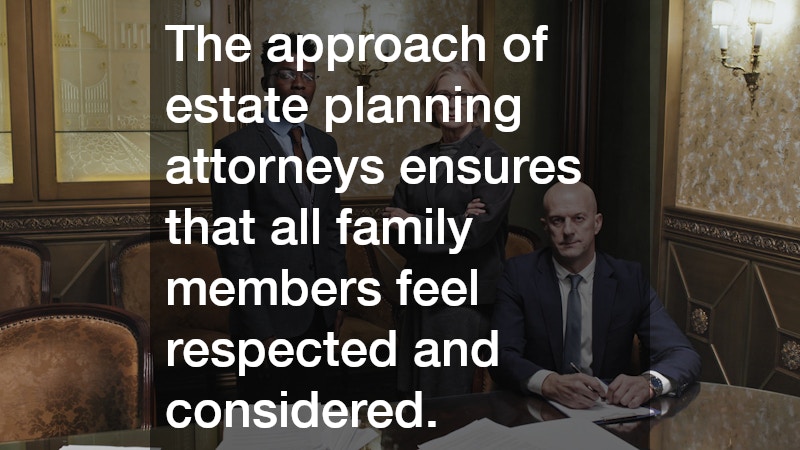In the realm of estate planning, family dynamics can often introduce complexities that require nuanced solutions. Estate planning lawyers play a crucial role in navigating these intricate situations to ensure that clients’ wishes are honored and that family relationships are preserved as much as possible. This article delves into the most common challenges faced in complex family situations and how attorneys adeptly manage these issues.
How Do Estate Lawyers Manage Disputes Among Family Members?
Mediation Techniques and Conflict Resolution
Estate planning attorneys often use mediation to facilitate constructive dialogue among family members, focusing on resolving disputes amicably. Mediation allows families to express their concerns in a controlled environment, aiming to arrive at mutually agreeable solutions.
The use of neutral third-party mediators can help to diffuse tension and provide an unbiased perspective. This method not only saves time and resources compared to litigation but also helps maintain family relationships.
Through skilled negotiation, attorneys can guide families towards understanding each other’s viewpoints. By highlighting shared goals, they work to bridge gaps in communication and reduce misunderstandings among relatives.
Legal Instruments to Prevent Future Conflicts
Lawyers employ various legal instruments, such as living trusts and detailed wills, to minimize potential disputes and clarify intentions. These documents offer clear directives, helping reduce ambiguity that might lead to conflict.
The specificity of a legal document can ward off future disputes by clearly outlining asset distribution. Moreover, establishing a trust allows for the seamless management of assets, bypassing probate and shielding family members from protracted legal battles.
By proactively addressing potential areas of contention, lawyers anticipate challenges before they escalate. These preemptive measures provide peace of mind and ensure that each family member understands their role in the estate plan.
What Strategies Do Lawyers Use for Blended Families?
Creating Custom Estate Plans That Address Unique Needs
Custom-built estate plans are essential to address the unique needs of blended families, ensuring fair distribution of assets. Tailoring these plans requires an understanding of the distinct dynamics and relationships within the family.
Estate planning attorneys take into account the history and expectations of all family members involved. This approach helps in crafting solutions that are equitable and considerate of each individual’s position.
By applying a personalized approach, lawyers can balance interests and mitigate potential disputes. This ensures that all parties, including those not directly related by blood, receive fair treatment.
Addressing Concerns of Biological and Stepchildren
It is crucial to balance the interests of biological and stepchildren, often requiring detailed legal strategies and open communication. Conflict often arises when perceived inequalities become apparent between the differing family factions.
Attorneys develop solutions that respect the rights of both biological and stepchildren, ensuring that estate plans do not favor one over the other. Clear communication and explanations of the reasoning behind asset distributions can help avoid resentment.
By involving the family in the planning process, lawyers can preemptively address potential grievances. This transparency allows for resolution before issues manifest, fostering a cooperative spirit among family members.
How Are Business Interests Handled in Family Estates?
Succession Planning for Family Businesses
Estate lawyers specialize in succession planning to ensure a smooth transition of business interests, preserving the family legacy. Succession planning includes identifying leadership roles, setting long-term goals, and ensuring that the business remains viable.
Identifying the right successor is crucial for the continuation of family businesses. This choice is often based on capability and willingness, rather than purely familial ties, ensuring sustained success.
Lawyers facilitate discussions that define the vision and governance structures for future generations. Such planning is vital for maintaining the business’s integrity while aligning with the estate’s overall objectives.
Valuing and Distributing Business Assets
Proper valuation and equitable distribution of business assets are key to preventing disputes and maintaining business continuity. Accurate valuation ensures each party receives their fair share of the business’s worth.
The process often involves financial experts who work alongside estate attorneys to appraise assets accurately. Ensuring transparency in how assets are valued can reduce suspicion and potential legal challenges.
Distribution models can be customized, taking into account the differing contributions and roles of family members in the business. These plans clarify the expectations and rights of each stakeholder, reducing the potential for intra-family disputes.
Estate planning in complex family situations requires a combination of legal expertise and sensitivity to family dynamics. By employing strategies such as mediation, customized estate plans, and detailed succession planning, estate planning lawyers can effectively manage challenges and help clients achieve their goals.
Through careful planning and open communication, these professionals ensure that family relations are preserved while honoring the client’s wishes. The nuanced approach of estate planning attorneys ensures that all family members feel respected and considered, which is key to harmonious outcomes.



